Backgrounder
“Fake” and “Hypocritical” – Western Anti-Racism Movements Criticized on Weibo
Chinese social media responses to the Western anti-racism movement after Floyd’s death.
Published
4 years agoon
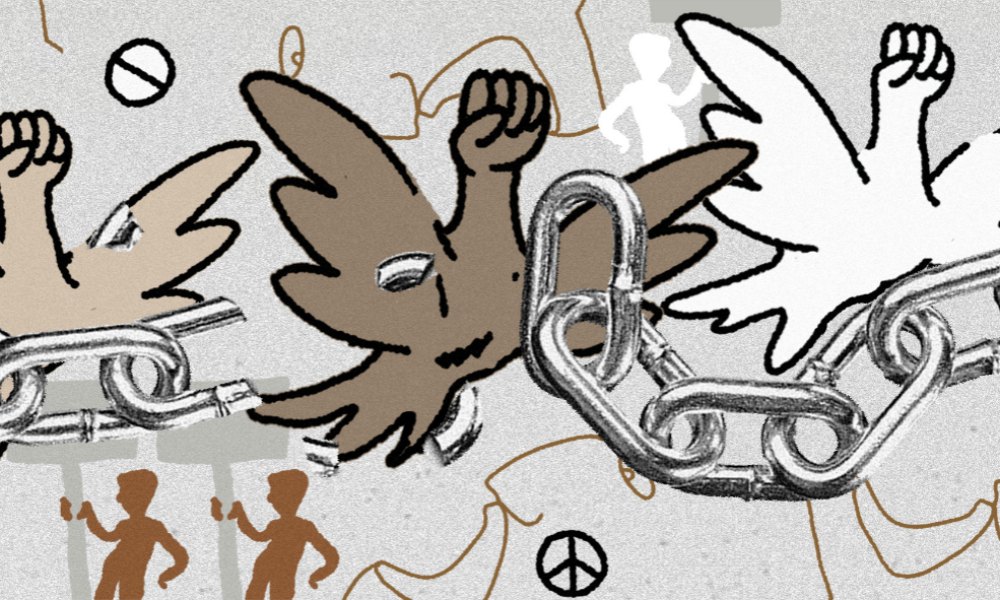
George Floyd and the global anti-racism movements have not just dominated headlines in the US and other western countries – in China, they have also become a major news topic. This is an overview of the general Chinese online media discussions of these global news developments, including all the big hashtags, from the George Floyd killing to global companies changing their policies amid concerns over racial stereotyping.
This is the “WE…WEI…WHAT?” column by Manya Koetse, original publication in German by Goethe Institut China (forthcoming), see Goethe.de: WE…WEI…WHAT? Manya Koetse erklärt das chinesische Internet.
George Floyd – it is a name that the entire world has come to know since the 46-year-old black man was killed during an arrest in May of this year.
The death of Floyd has sparked major Black Lives Matter protests around the world, inspiring international movements fighting against racism. The incident also led to unrest, riots, and the defacement of controversial statues in America and other countries.
In solidarity with the Black Lives Matter movement and the fight against systemic racism, many organizations and companies in western countries have also made various anti-racist statements and announced policy changes.

Minneapolis graffiti mural honoring George Floyd, photo by Munshots, Unsplash.
In China, the case of George Floyd (transcribed as 乔治•弗洛伊德 Qiáozhì Fúluòyīdé) and its ongoing aftermath have also made headlines in the media and have become big news topics on social media sites such as Weibo.
In a year of COVID-19 crisis and geopolitical tensions – including escalating China-US tensions and the passing of the national security law for Hong Kong -, many of the recent news stories do not stand alone.
The way the news is reported and discussed in China by state media and web users is often part of larger narratives about China and its current relations within the international community. But it’s not just politics; cultural context also greatly matters when it comes to how the anti-racism movement in the Floyd aftermath is perceived in the PRC.
“Oh, How Free America Is” – Floyd’s Killing
As now widely known, the George Floyd incident took place in Minneapolis, Minnesota, on May 25, when police responded to a shopkeeper’s call about someone potentially using a counterfeit bill. Floyd was sitting in his car when officers arrived at the scene and was asked to step out of his vehicle.
Even though Floyd was compliant and unarmed, a bystander video shows how he was held face-down on the ground, the officer pressing his knee into the side of his neck, while Floyd was begging for air, uttering the sentence: “I can’t breathe.”
While the officer knelt on Floyd’s neck for over seven minutes, the 46-year-old could be seen losing consciousness and going limp.
The video of the fatal arrest went viral on social media overnight, and soon led to people protesting in Minneapolis and elsewhere across the US, demanding justice over the fatal arrest.
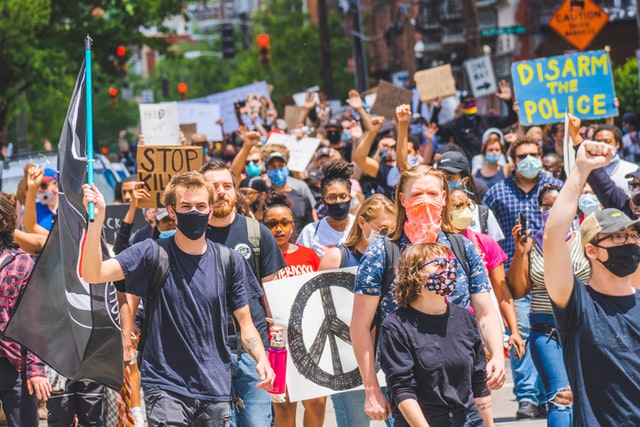
Black Lives Matter public demonstration in Cincinnati, photo by Julian Wan, Unsplash.
The four officers involved in George Floyd’s death have since been fired from the Minneapolis Police Department and have been criminally charged. Tensions in Minnesota reached a boiling point and protests escalated to riots and lootings, with Minneapolis Mayor Jacob Frey declaring a state of emergency on May 29.
On that same day, CNN correspondent Omar Jimenez, a reporter of color, was arrested and handcuffed on live television together with his cameraman and producer while reporting on the situation in Minneapolis. Although the CNN crew was released shortly after, the incident also further intensified the debate on discrimination and racism in America.
On Weibo, news of the George Floyd incident and the American protests soon went trending with various related hashtags.
By late May and early June, some of the top Weibo hashtags regarding the protests were “CNN Crew Arrested by Police” (#CNN报道团队被警方逮捕#, 170 million views), “Minneapolis Enters State of Emergency” (#美国明尼阿波利斯市进入紧急状态#, 370 million views), “Protests Erupt over Case of Black Man Dying after American Police Applies Pressure on Neck” (#美警察压颈致黑人死亡引发抗议#, 7+ million views), “American Anti-Racist Demonstrations” (#美国反种族歧视游行#, 3+ million views) and many more.
The hashtag “U.S. Riots” (#美国暴乱#) garnered over 5,3 billion views and triggered thousands of reactions on Chinese social media.
Many of the Weibo responses to the killing of George Floyd and its direct aftermath incorporated these developments into a bigger framework of strained US-China relations, pointing out the supposed American hypocrisy for criticizing China regarding freedom and human rights, especially in light of the COVID19-crisis and the Hong Kong situation.
“Oh how free America is,” one popular comment on Weibo said (“多么自由的米国”), with others saying things such as: “Are these the human rights you are advocating?”
Commenters expressed their disgust at the brutality of the policemen, calling the police officers “ruthless” and “sadistic,” with some – not without sarcasm – wondering if China should introduce an “anti-racism law” against US officials responsible for racial abuse.
News of CNN reporter Jimenez being arrested by the American state patrol was also shared on Weibo by the Communist Youth League official account, leading to many reactions criticizing America’s “freedom of press.”
“So this is so-called equality? Freedom? Democracy?” Another user writes: “So this is the freedom I’m yearning for? Is this called freedom?”
Some Weibo users shared compilations showing American officers using excessive force and violence while beating and shooting down people during their work.
Although criticism of the US-dominated Chinese online discussions of Floyd’s killing, there were also social media users showing support for the protesters: “I fully support the movement of Black Americans fighting for the rule of law, equality, and freedom,” one popular comment, receiving over 14,000 likes, said.
One blogger with over 123,000 followers wrote: “The riots erupting in the US will surely have a negative impact on society. But looking at it from another perspective, it still makes me envious because they have the guts to speak up, the courage to resist. If such a thing would happen in China, would you stand up?”
“Fake Anti-Racism” – From The Simpsons to Darlie Toothpaste
As George Floyd protests have now ignited a wave of anti-racism efforts across the globe, there are also new hashtags popping up on Chinese social media that are generating a lot of discussion.
Although the protesters denouncing racism and police brutality directly after the Floyd killing were often praised on Chinese social media, some of the latest efforts by companies and brands – showing wider consideration of racism in media, fashion, and entertainment – met less sympathy among Chinese web users.
One example is the news-related hashtag “The Simpsons Cartoon Stops Using White People to Dub the Voices of Non-White Roles” (#动画辛普森不再用白人为非白人配音#), which had over 90 million views on Weibo at time of writing. In late June, producers of The Simpsons announced that they will no longer let white actors do the voices of characters of color.
“Bloody hell, [as if] you can hear by the voices if they are white or not?!”, a typical comment said, with other recurring comments saying: “This is crazy! Voices aren’t black or white.”
“Just make them all blue,” others suggested, with one person writing: “They [the Simpsons] all have yellow skin, why don’t they use actors of Asian descent to do their voices? This is fake so-called anti-racism.”
Others also argue that these kinds of initiatives only stress racial differences, instead of combating racism: “The more it’s like this, the more they stress the importance of racial distinction. Why?”
Other anti-discrimination initiatives, such as that of Unilever and beauty brand L’Oréal Paris to stop using words like “whitening” and “fair” in describing their products, together with other brands’ initiatives to remove some skin-whitening products altogether, also received a lot of attention on Weibo (hashtag #欧莱雅停用美白宣传语#, 110 million views).

“This goes too far,” “Unbelievable,” “How unnecessary,” many commenters wrote, adding: “What does this have to do with racial discrimination?” “Isn’t this just another form of discrimination?”
“Why do I feel that it’s Asians who are being discriminated against here,” some users said: “Different ethnicities have different beauty standards, different people also have different tastes in beauty. For many Asians, they just happen to think fair skin is pretty.“
Noteworthy enough, the critical stances that are ubiquitous on Weibo toward this kind of initiatives are not just visible from the most general comments; the news sources posting these news articles, from Xinhua to Sina Top Trending, also use ‘thinking face’ or ‘surprised’ emoji in their posts that suggest a certain reproachful attitude towards these kinds of developments.

Chinese media often use pensive/surprised emoji when reporting on western brands’ anti-racism policies (image: screenshot of Xinhua reporting on L’Oréal).
Another notable brand response to the anti-racism movement also ignited online discussions: Colgate announced a review of its Chinese toothpaste brand “Darlie”[1], once known as “Darkie” (literally “Black Man Toothpaste” 黑人牙膏 in Chinese), for featuring a man in blackface.
Some of the hashtags used in discussing this news are “Black Man Toothpaste is the Latest Brand Affected by American Anti-Racism” (#黑人牙膏成美反种族歧视受影响最新品牌#) and “Colgate Considers Changing the Name of the Chinese Market ‘Black Man Toothpaste’” (#高露洁考虑将中国市场黑人牙膏改名#, 110 million views).
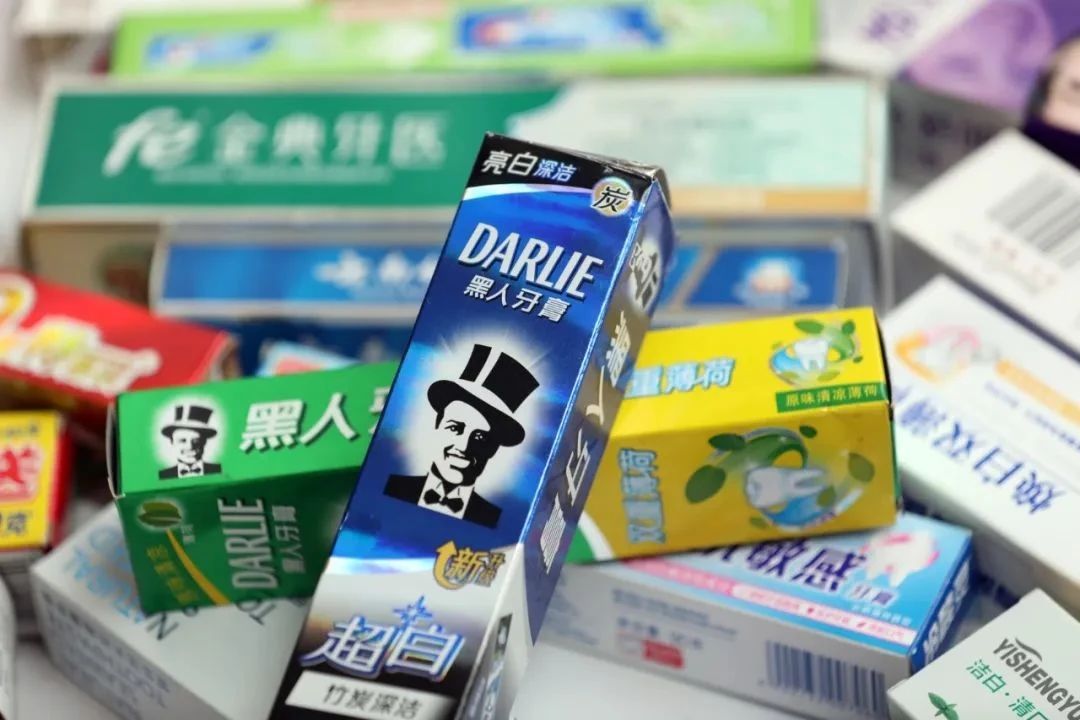
Darlie toothpaste is a household name for many Chinese (image via Sina Weibo).
Darlie toothpaste is originally a Chinese brand, under the umbrella of the 87-year-old Shanghai company Hawley & Hazel, and is a household name for many Chinese. The overall sentiment in response to this news is that many do not understand how changing the brand is helpful in the battle against social injustice.
“I just don’t see how this is racial discrimination,” one person comments: “How is this stereotyping [black men]?”
News that America’s biggest bank JPMorgan Chase is dropping the terms “master,” “slave,” and “blacklist” from its technology material and programming code was also met with criticism on Weibo (#摩根大通停用黑名单等术语#), where some wondered if they had “gone mad” and whether this way some sort of “literary inquisition.”
In a recent blog article on Weibo discussing these latest developments, blogger Captain Wuya (@乌鸦校尉) wrote about the brands and companies involved that “they are waving their big stick of political correctness at anyone they can hit.“
“What really needs to change here, is American big brands exaggerating the facts,” another popular comment said.
“Excessive Political Correctness” – Rejection of Western Anti-Racist Policies
The latest anti-racism movement in western countries is clearly discussed in a very different way in the Chinese social media context than it is in the English-language social media sphere.
Although many of the latest anti-racism initiatives by brands and companies also draw a mix of praise and criticism on Twitter or Facebook, the general view on Weibo seems to be that they are “fake,” “overdoing it,” are “unnecessary” and “non-sensical,” and that they stress racial differences rather than equality. Another recurring sentiment is that anti-black racism is prioritized over racism against Asians.
The different views among Chinese social media users on what is deemed racist or not has attracted wide attention before. One noteworthy example is that of the 2016 Qiaobi laundry detergent commercial that shows a black man turning into a Chinese man after being ‘washed.’ The commercial was taken down after causing controversy outside of China.

The Chinese Qiaobi commercial drew much controversy for being racist in 2016.
A typical comment on Chinese social media, at the time, was: “Western media have just taken their concept of ‘racism’ and applied it [to this commercial]. In reality, the great majority of Chinese people have no notion of ‘white’ versus ‘black’ or ‘Asian’, and any supposed inferiority in this.”
Similar responses also came up when the 2018 CCTV Gala caused consternation in foreign media for featuring a Chinese actress wearing blackface in a segment emphasizing Sino-African relations.
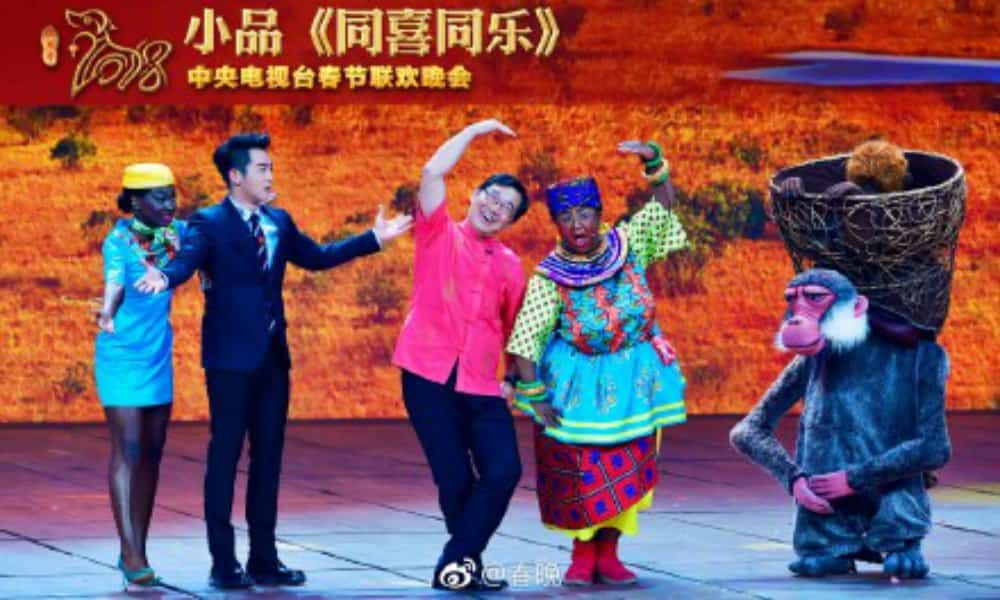
The controversial skit included a Chinese actress in blackface (CCTV).
These attitudes and general comments seem to suggest that racism or discrimination is just less of an issue in China, or that it is soon trivialized. Is this the case?
Issues of racism and discrimination are certainly not trivialized in China when it is about anti-Asian racism. Throughout modern history, the Chinese have been victims of racism. Over recent years, there are myriad examples of collective anger and boycott campaigns because Chinese feel discriminated against.
For example, when Italian luxury brand Dolce & Gabbana launched a promotional video in which a Chinese-looking woman clumsily attempted to eat a large cannoli bread with chopsticks, many netizens on Chinese social media called it racist. After screenshots went viral of a China-bashing online conversation with the alleged Stefano Gabbana, the issue became one of the largest trending topics on Weibo in 2018.
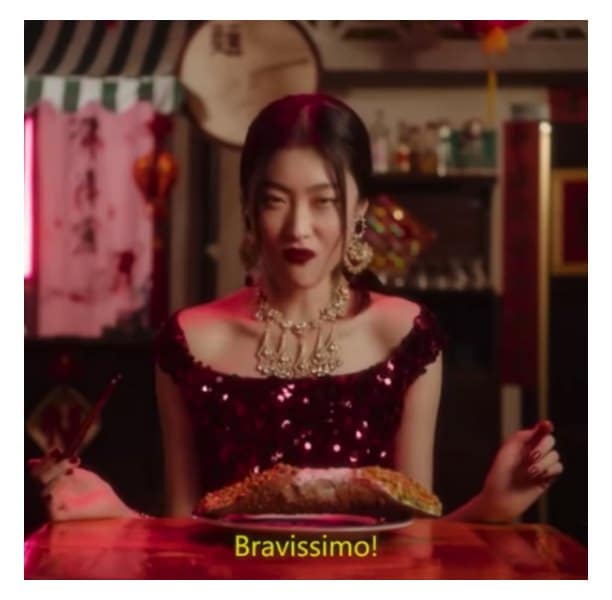
The COVID-19 pandemic has also led to an increase in racism in the US and other countries directed at those of Asian descent, something that has recently become a hot topic on Chinese social media, triggering anger and calls for equal treatment of Asians.
Is it, then, perhaps that discrimination and racial inequality within mainland China are not so much of an issue? This certainly is also not the case. Besides the many different shapes and forms of discrimination – regional discrimination being one of them –, there are many examples of anti-black racism in China. Online racism against Africans has been an ongoing issue on Weibo ever since the platform was first launched in 2009 (example, example).
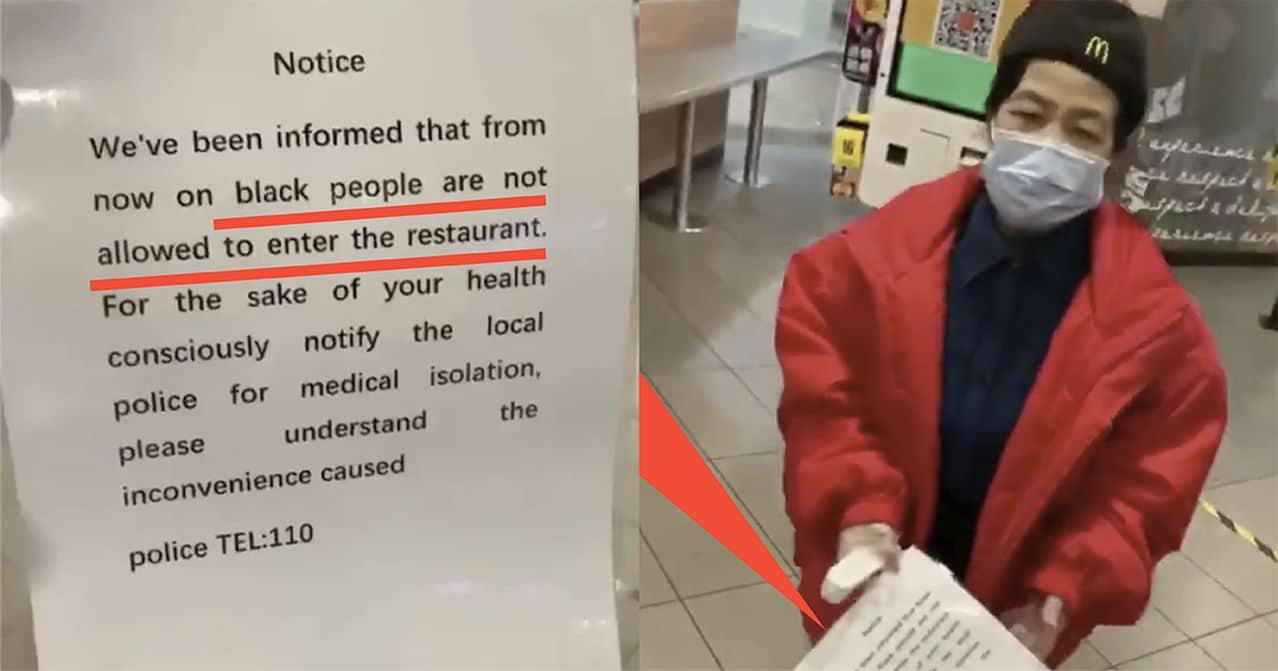
A notice at a Guangzhou McDonald’s restaurant saying “black people cannot come in” sparked international outrage earlier this year.
Voices against the discriminatory treatment of Africans in China have only grown louder during the coronavirus outbreak, when hundreds of Guangzhou-based Africans were evicted from hotels and apartments after local authorities began a campaign to forcibly test them for the coronavirus. A notice at a Guangzhou McDonald’s restaurant saying “black people cannot come in” sparked international outrage earlier this year.
All in all, it is not about racism being non-existent in China, nor is it trivialized. The fact that the latest western developments are discussed in such a different light on Chinese social media has much more to do with how American and European anti-racist policies, and the grip they hold on media, politics, and the corporate world, are rejected by Chinese netizens.
This does not mean that the Floyd incident is deemed any less horrific in China than elsewhere in the world. Social injustice and inequality are recurring topics on Chinese social media, and it is something that greatly matters to many Chinese web users, with these kinds of stories going trending all the time.
It does mean, however, that western approaches to anti-racism, with the racial etiquette that comes with it and a focus on what is correct or incorrect when it comes to language, imagery and behavior, are often deemed excessive (“矫枉过正”) by Chinese web users – or useless in actually combating social inequality.
These responses have a lot to do with current geopolitical developments and the position of China within the international community, but more so with the fact that China has a very different historical, cultural, and societal context when it comes to (anti-black) racism compared to the US or other western countries.
In a lengthy article posted on Weibo in early July by Chinese commentator and academic Guo Songmin (郭松民), who has been actively posting about the Black Lives Matter movement, the prominent leftist author explains that this also has a lot to do with the fact that, different from most western countries, “China has neither a history of slavery nor a history of colonizing Africa,” and that, at the same time, China is also not a country of immigrants.
In the end, some say that they do understand the latest anti-racist initiatives by American and European companies in their home markets, but also argue that they should not impose their political correctness upon the Chinese market.
A recent Weibo blog, reiterating the views of many on Weibo, argues that Darlie Toothpaste should still be ‘Black Man Toothpaste’ in China, and that cosmetic brands should continue to cater their ‘whitening’ products to the Chinese market. According to the author, these colors, words, and imageries mean something different in the PRC than in the West. “If European and American cosmetic companies truly respect the cultural and ethnic diversities across the world,” they write: “they should also respect the culture and aesthetics of East Asians.”
To what extent the anti-racist movement will eventually affect the Chinese market, and how -and if- this will change existing views on racism remains to be seen. Meanwhile, heated discussions continue on social media. For some Weibo commenters, the situation at hand seems clear enough: “American-style political correctness just makes no sense here.”
By Manya Koetse
Follow @whatsonweibo
For COVID-19 related articles, please click here.
[1] Darlie is a toothpaste brand of Colgate partner Hawley & Hazel, that was established in Shanghai in 1933, and was originally marketed as a parody of American performer Al Jolson. He became popular for his blackface performances, and the whiteness of his teeth made him the face of the toothpaste brand.
Spotted a mistake or want to add something? Please let us know in comments below or email us. First-time commenters, please be patient – we will have to manually approve your comment before it appears.
This text was written for Goethe-Institut China under a CC-BY-NC-ND-4.0-DE license (Creative Commons) as part of a monthly column in collaboration with What’s On Weibo.
Manya Koetse is the founder and editor-in-chief of whatsonweibo.com. She is a writer, public speaker, and researcher (Sinologist, MPhil) on social trends, digital developments, and new media in an ever-changing China, with a focus on Chinese society, pop culture, and gender issues. She shares her love for hotpot on hotpotambassador.com. Contact at manya@whatsonweibo.com, or follow on Twitter.

Backgrounder
“Oppenheimer” in China: Highlighting the Story of Qian Xuesen
Qian Xuesen is a renowned Chinese scientist whose life shares remarkable parallels with Oppenheimer’s.
Published
10 months agoon
September 16, 2023By
Zilan Qian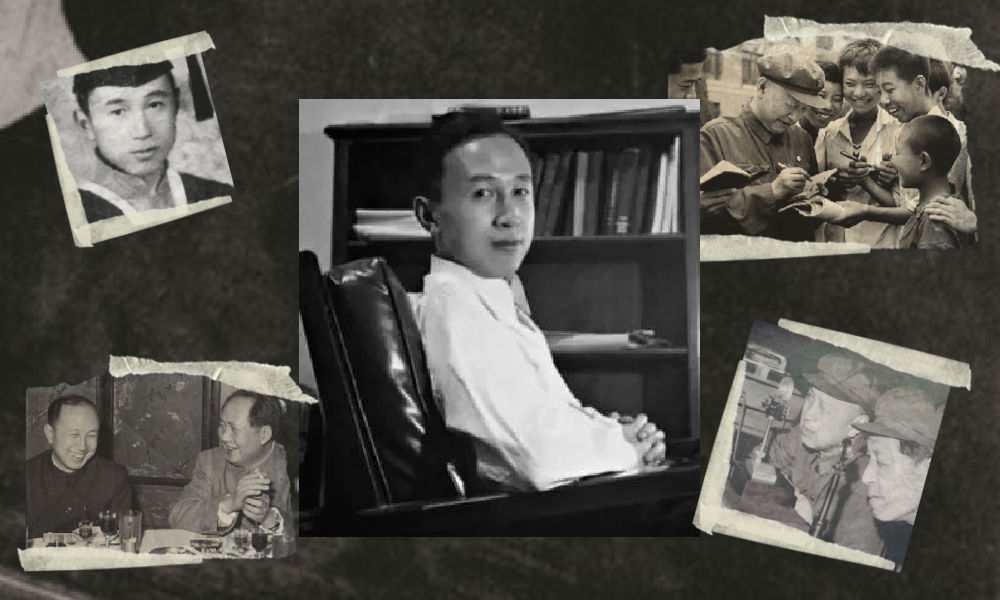
They shared the same campus, lived in the same era, and both played pivotal roles in shaping modern history while navigating the intricate interplay between science and politics. With the release of the “Oppenheimer” movie in China, the renowned Chinese scientist Qian Xuesen is being compared to the American J. Robert Oppenheimer.
In late August, the highly anticipated U.S. movie Oppenheimer finally premiered in China, shedding light on the life of the famous American theoretical physicist J. Robert Oppenheimer (1904-1967).
Besides igniting discussions about the life of this prominent scientist, the film has also reignited domestic media and public interest in Chinese scientists connected to Oppenheimer and nuclear physics.
There is one Chinese scientist whose life shares remarkable parallels with Oppenheimer’s. This is aerospace engineer and cyberneticist Qian Xuesen (钱学森, 1911-2009). Like Oppenheimer, he pursued his postgraduate studies overseas, taught at Caltech, and played a pivotal role during World War II for the US.
Qian Xuesen is so widely recognized in China that whenever I introduce myself there, I often clarify my last name by saying, “it’s the same Qian as Qian Xuesen’s,” to ensure that people get my name.
Some Chinese blogs recently compared the academic paths and scholarly contributions of the two scientists, while others highlighted the similarities in their political challenges, including the revocation of their security clearances.
The era of McCarthyism in the United States cast a shadow over Qian’s career, and, similar to Oppenheimer, he was branded as a “communist suspect.” Eventually, these political pressures forced him to return to China.
Although Qian’s return to China made his later life different from Oppenheimer’s, both scientists lived their lives navigating the complex dynamics between science and politics. Here, we provide a brief overview of the life and accomplishments of Qian Xuesen.
Departing: Going to America
Qian Xuesen (钱学森, also written as Hsue-Shen Tsien), often referred to as the “father of China’s missile and space program,” was born in Shanghai in 1911,1 a pivotal year marked by a historic revolution that brought an end to the imperial dynasty and gave rise to the Republic of China.
Much like Oppenheimer, who pursued further studies at Cambridge after completing his undergraduate education, Qian embarked on a journey to the United States following his bachelor’s studies at National Chiao Tung University (now Shanghai Jiao Tong University). He spent a year at Tsinghua University in preparation for his departure.
The year was 1935, during the eighth year of the Chinese Civil War and the fourth year of Japan’s invasion of China, setting the backdrop for his academic pursuits in a turbulent era.
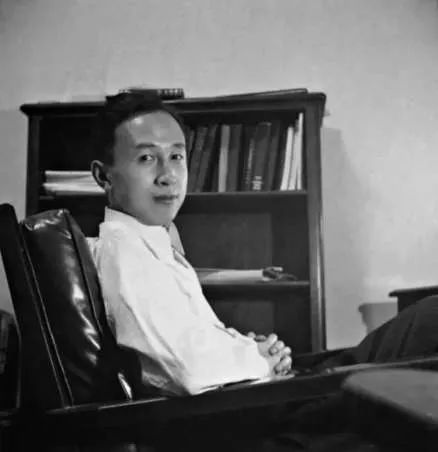
Qian in his office at Caltech (image source).
One year after arriving in the U.S., Qian earned his master’s degree in aeronautical engineering from the Massachusetts Institute of Technology (MIT). Three years later, in 1939, the 27-year-old Qian Xuesen completed his PhD at the California Institute of Technology (Caltech), the very institution where Oppenheimer had been welcomed in 1927. In 1943, Qian solidified his position in academia as an associate professor at Caltech. While at Caltech, Qian helped found NASA’s Jet Propulsion Laboratory.
When World War II began, while Oppenheimer was overseeing the Manhattan Project’s efforts to assist the U.S. in developing the atomic bomb, Qian actively supported the U.S. government. He served on the U.S. government’s Scientific Advisory Board and attained the rank of lieutenant colonel.

The first meeting of the US Department of the Air Force Scientific Advisory Board in 1946. The predecessor, the Scientific Advisory Group, was founded in 1944 to evaluate the aeronautical programs and facilities of the Axis powers of World War II. Qian can be seen standing in the back, the second on the left (image source).
After the war, Qian went to teach at MIT and returned to Caltech as a full-time professor in 1949. During that same year, Mao Zedong proclaimed the establishment of the People’s Republic of China (PRC). Just one year later, the newly-formed nation became involved in the Korean War, and China fought a bloody battle against the United States.
Red Scare: Being Labeled as a Communist
Robert Oppenheimer and Qian Xuesen both had an interest in Communism even prior to World War II, attending communist gatherings and showing sympathy towards the Communist cause.
Qian and Oppenheimer may have briefly met each other through their shared involvement in communist activities. During his time at Caltech, Qian secretly attended meetings with Frank Oppenheimer, the brother of J. Robert Oppenheimer (Monk 2013).
However, it was only after the war that their political leanings became a focal point for the FBI.
Just as the FBI accused Oppenheimer of being an agent of the Soviet Union, they quickly labeled Qian as a subversive communist, largely due to his Chinese heritage. While the government did not succeed in proving that Qian had communist ties with China during that period, they did ultimately succeed in portraying Qian as a communist affiliated with China a decade later.
During the transition from the 1940s to the 1950s, the Cold War was underway, and the anti-communist witch-hunts associated with the McCarthy era started to intensify (BBC 2020).
In 1950, the Korean War erupted, with the People’s Republic of China (PRC) joining North Korea in the conflict against South Korea, which received support from the United States. It was during this tumultuous period that the FBI officially accused Qian of communist sympathies in 1950, leading to the revocation of his security clearance despite objections from Qian’s colleagues. Four years later, in 1954, Robert Oppenheimer went through a similar process.
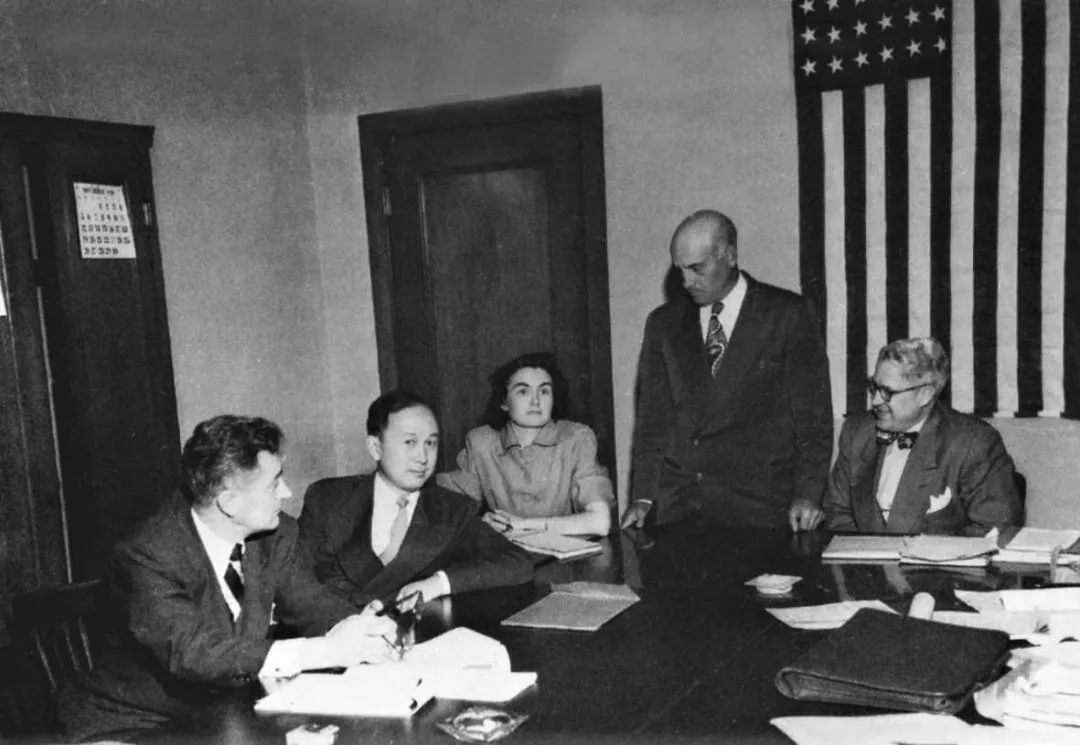
The 1950’s security hearing of Qian (second left). (Image source).
After losing his security clearance, Qian began to pack up, saying he wanted to visit his aging parents back home. Federal agents seized his luggage, which they claimed contained classified materials, and arrested him on suspicion of subversive activity. Although Qian denied any Communist leanings and rejected the accusation, he was detained by the government in California and spent the next five years under house arrest.
Five years later, in 1955, two years after the end of the Korean War, Qian was sent home to China as part of an apparent exchange for 11 American airmen who had been captured during the war. He told waiting reporters he “would never step foot in America again,” and he kept his promise (BBC 2020).
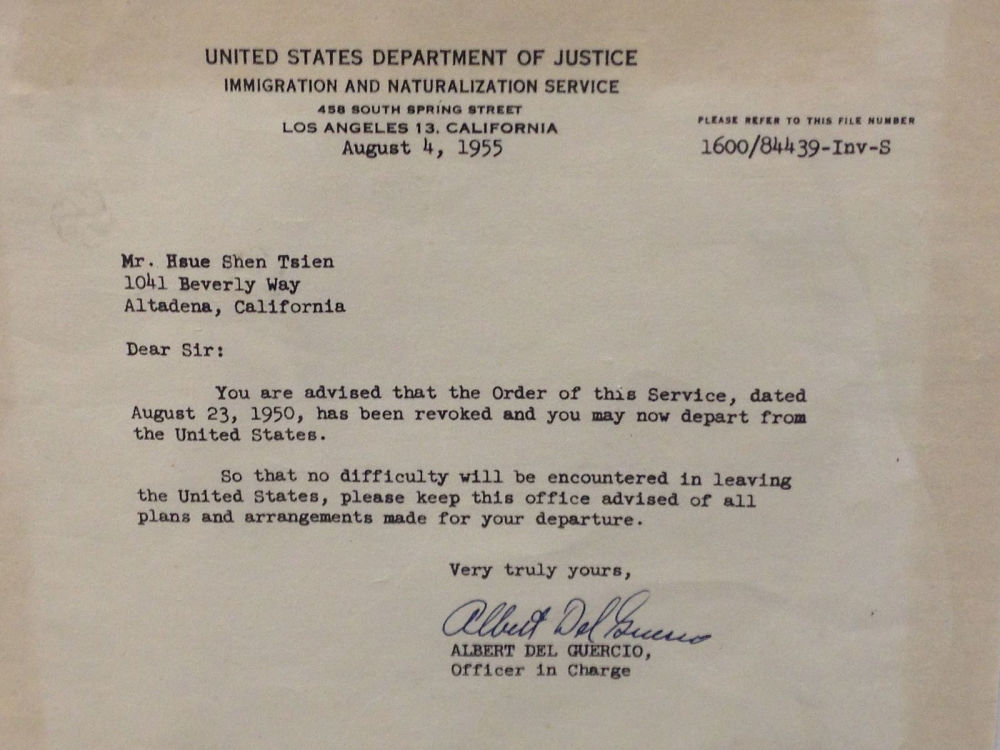
A letter from the US Immigration and Naturalization Service to Qian Xuesen, dated August 4, 1955, in which he was notified he was allowed to leave the US. The original copy is owned by Qian Xuesen Library of Shanghai Jiao Tong University, where the photo was taken. (Caption and image via wiki).
Dan Kimball, who was the Secretary of the US Navy at the time, expressed his regret about Qian’s departure, reportedly stating, “I’d rather shoot him dead than let him leave America. Wherever he goes, he equals five divisions.” He also stated: “It was the stupidest thing this country ever did. He was no more a communist than I was, and we forced him to go” (Perrett & Bradley, 2008).
Kimball may have foreseen the unfolding events accurately. After his return to China, Qian did indeed assume a pivotal role in enhancing China’s military capabilities, possibly surpassing the potency of five divisions. The missile programme that Qian helped develop in China resulted in weapons which were then fired back on America, including during the 1991 Gulf War (BBC 2020).
Returning: Becoming a National Hero
The China that Qian Xuesen had left behind was an entirely different China than the one he returned to. China, although having relatively few experts in the field, was embracing new possibilities and technologies related to rocketry and space exploration.
Within less than a month of his arrival, Qian was welcomed by the then Vice Prime Minister Chen Yi, and just four months later, he had the honor of meeting Chairman Mao himself.
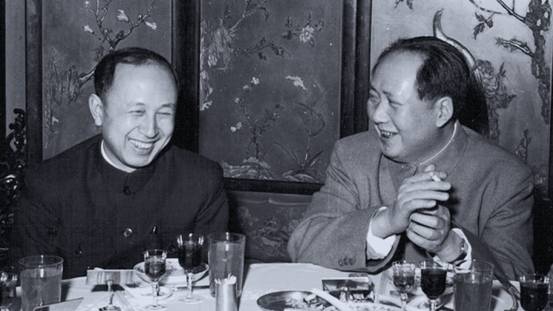
Qian and Mao (image source).
In China, Qian began a remarkably successful career in rocket science, with great support from the state. He not only assumed leadership but also earned the distinguished title of the “father” of the Chinese missile program, instrumental in equipping China with Dongfeng ballistic missiles, Silkworm anti-ship missiles, and Long March space rockets.
Additionally, his efforts laid the foundation for China’s contemporary surveillance system.
By now, Qian has become somewhat of a folk hero. His tale of returning to China despite being thwarted by the U.S. government has become like a legendary narrative in China: driven by unwavering patriotism, he willingly abandoned his overseas success, surmounted formidable challenges, and dedicated himself to his motherland.
Throughout his lifetime, Qian received numerous state medals in recognition of his work, establishing him as a nationally celebrated intellectual. From 1989 to 2001, the state-launched public movement “Learn from Qian Xuesen” was promoted throughout the country, and by 2001, when Qian turned 90, the national praise for him was on a similar level as that for Deng Xiaoping in the decade prior (Wang 2011).
Qian Xuesen remains a celebrated figure. On September 3rd of this year, a new “Qian Xuesen School” was established in Wenzhou, Zhejiang Province, becoming the sixth high school bearing the scientist’s name since the founding of the first one only a year ago.

In 2017, the play “Qian Xuesen” was performed at Qian’s alma mater, Shanghai Jiaotong University. (Image source.)
Qian Xuesen’s legacy extends well beyond educational institutions. His name frequently appears in the media, including online articles, books, and other publications. There is the Qian Xuesen Library and a museum in Shanghai, containing over 70,000 artefacts related to him. Qian’s life story has also been the inspiration for a theater production and a 2012 movie titled Hsue-Shen Tsien (钱学森).2
Unanswered Questions
As is often the case when people are turned into heroes, some part of the stories are left behind while others are highlighted. This holds true for both Robert Oppenheimer and Qian Xuesen.
The Communist Party of China hailed Qian as a folk hero, aligning with their vision of a strong, patriotic nation. Many Chinese narratives avoid the debate over whether Qian’s return was linked to problems and accusations in the U.S., rather than genuine loyalty to his homeland.
In contrast, some international media have depicted Qian as a “political opportunist” who returned to China due to disillusionment with the U.S., also highlighting his criticism of “revisionist” colleagues during the Cultural Revolution and his denunciation of the 1989 student demonstrations.
Unlike the image of a resolute loyalist favored by the Chinese public, Qian’s political ideology was, in fact, not consistently aligned, and there were instances where he may have prioritized opportunity over loyalty at different stages of his life.
Qian also did not necessarily aspire to be a “flawless hero.” Upon returning to China, he declined all offers to have his biography written for him and refrained from sharing personal information with the media. Consequently, very little is known about his personal life, leaving many questions about the motivations driving him, and his true political inclinations.

The marriage photo of Qian and Jiang. (Image source).
We do know that Qian’s wife, Jiang Ying (蒋英), had a remarkable background. She was of Chinese-Japanese mixed race and was the daughter of a prominent military strategist associated with Chiang Kai-shek. Jiang Ying was also an accomplished opera singer and later became a professor of music and opera at the Central Conservatory of Music in Beijing.
Just as with Qian, there remain numerous unanswered questions surrounding Oppenheimer, including the extent of his communist sympathies and whether these sympathies indirectly assisted the Soviet Union during the Cold War.
Perhaps both scientists never imagined they would face these questions when they first decided to study physics. After all, they were scientists, not the heroes that some narratives portray them to be.
Also read:
■ Farewell to a Self-Taught Master: Remembering China’s Colorful, Bold, and Iconic Artist Huang Yongyu
■ “His Name Was Mao Anying”: Renewed Remembrance of Mao Zedong’s Son on Chinese Social Media
By Zilan Qian
Follow @whatsonweibo
1 Some sources claim that Qian was born in Hangzhou, while others say he was born in Shanghai with ancestral roots in Hangzhou.
2The Chinese character 钱 is typically romanized as “Qian” in Pinyin. However, “Tsien” is a romanization in Wu Chinese, which corresponds to the dialect spoken in the region where Qian Xuesen and his family have ancestral roots.
This article has been edited for clarity by Manya Koetse
References (other sources hyperlinked in text)
BBC. 2020. “Qian Xuesen: The man the US deported – who then helped China into space.” BBC.com, 27 October https://www.bbc.com/news/stories-54695598 [9.16.23].
Monk, Ray. 2013. Robert Oppenheimer: A Life inside the Center, First American Edition. New York: Doubleday.
Perrett, Bradley, and James R. Asker. 2008. “Person of the Year: Qian Xuesen.” Aviation Week and Space Technology 168 (1): 57-61.
Wang, Ning. 2011. “The Making of an Intellectual Hero: Chinese Narratives of Qian Xuesen.” The China Quarterly, 206, 352-371. doi:10.1017/S0305741011000300
Get the story behind the hashtag. Subscribe to What’s on Weibo here to receive our newsletter and get access to our latest articles:
Spotted a mistake or want to add something? Please let us know in comments below or email us. First-time commenters, please be patient – we will have to manually approve your comment before it appears.
©2023 Whatsonweibo. All rights reserved. Do not reproduce our content without permission – you can contact us at info@whatsonweibo.com.
Backgrounder
Farewell to a Self-Taught Master: Remembering China’s Colorful, Bold, and Iconic Artist Huang Yongyu
Renowned Chinese artist and the creator of the ‘Blue Rabbit’ zodiac stamp Huang Yongyu has passed away at the age of 98. “I’m not afraid to die. If I’m dead, you may tickle me and see if I smile.”
Published
1 year agoon
June 15, 2023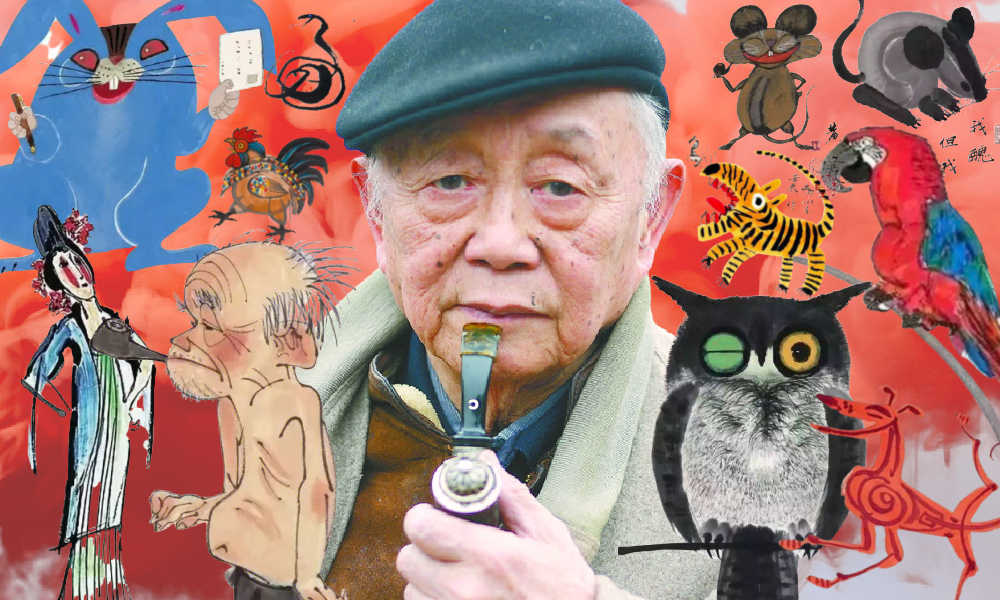
The famous Chinese painter, satirical poet, and cartoonist Huang Yongyu has passed away. Born in 1924, Huang endured war and hardship, yet never lost his zest for life. When his creativity was hindered and his work was suppressed during politically tumultuous times, he remained resilient and increased “the fun of living” by making his world more colorful.
He was a youthful optimist at old age, and will now be remembered as an immortal legend. The renowned Chinese painter and stamp designer Huang Yongyu (黄永玉) passed away on June 13 at the age of 98. His departure garnered significant attention on Chinese social media platforms this week.
On Weibo, the hashtag “Huang Yongyu Passed Away” (#黄永玉逝世#) received over 160 million views by Wednesday evening.
Huang was a member of the China National Academy of Painting (中国国家画院) as well as a Professor at the Central Academy of Fine Arts (中央美术学院).
Huang Yongyu is widely recognized in China for his notable contribution to stamp design, particularly for his iconic creation of the monkey stamp in 1980. Although he designed a second monkey stamp in 2016, the 1980 stamp holds significant historical importance as it marked the commencement of China Post’s annual tradition of releasing zodiac stamps, which have since become highly regarded and collectible items.
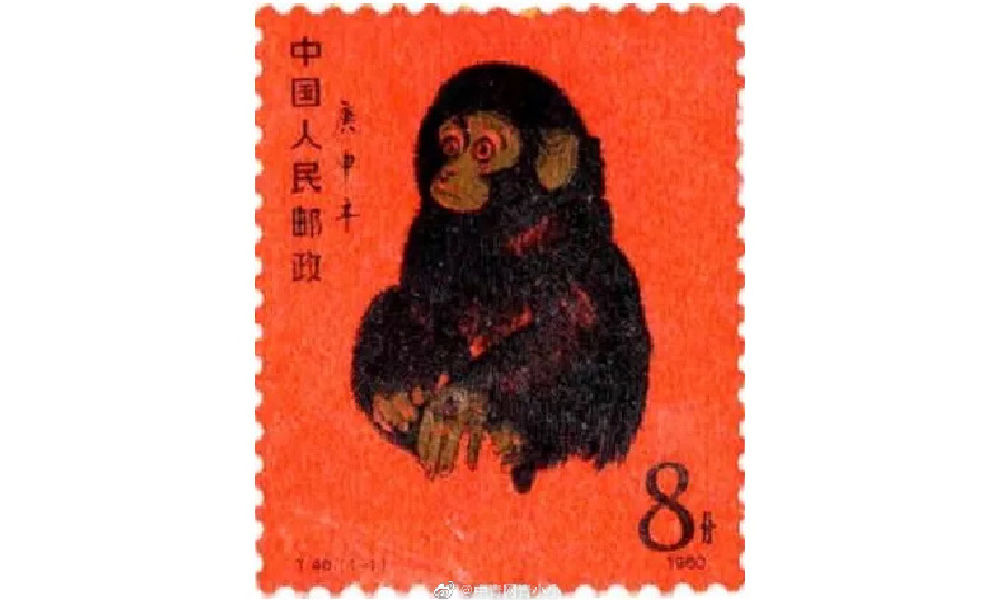
Huang’s famous money stamp that was issued by China Post in 1980.
The monkey stamp designed by Huang Yongyu has become a cherished collector’s item, even outside of China. On online marketplaces like eBay, individual stamps from this series are being sold for approximately $2000 these days.
Huang Yongyu’s latest most famous stamp was this year’s China Post zodiac stamp. The stamp, a blue rabbit with red eyes, caused some online commotion as many people thought it looked “horrific.”
Some thought the red-eyed blue rabbit looked like a rat. Others thought it looked “evil” or “monster-like.” There were also those who wondered if the blue rabbit looked so wild because it just caught Covid.
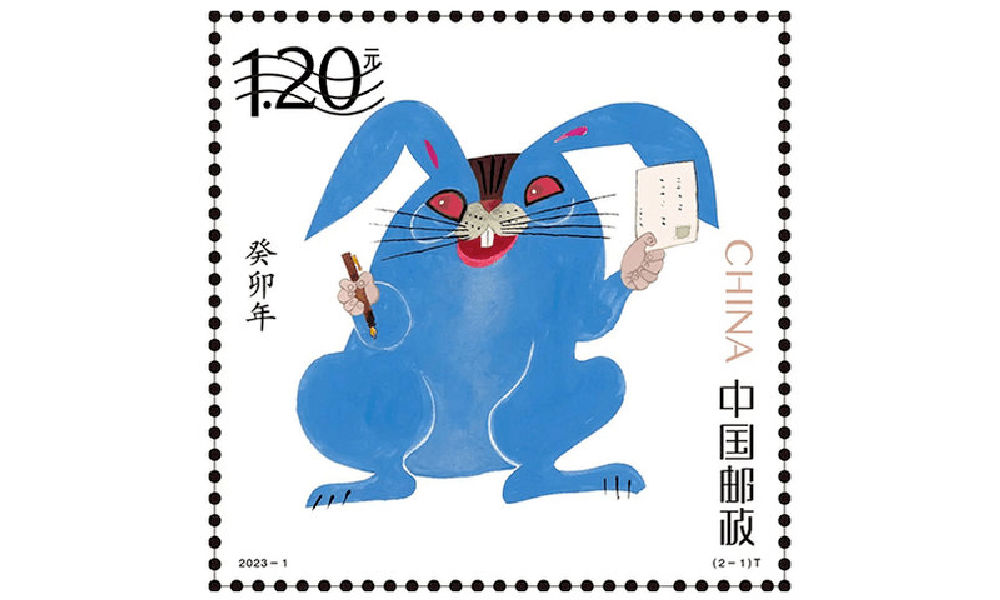
Huang’s (in)famous blue rabbit stamp.
Nevertheless, many people lined up at post offices for the stamps and they immediately sold out.
In light of the controversy, Huang Yongyu spoke about the stamps in a livestream in January of 2023. The 98-year-old artist claimed he had simply drawn the rabbit to spread joy and celebrate the new year, stating, “Painting a rabbit stamp is a happy thing. Everyone could draw my rabbit. It’s not like I’m the only one who can draw this.”
Huang’s response also went viral, with one Weibo hashtag dedicated to the topic receiving over 12 million views (#蓝兔邮票设计者直播回应争议#) at the time. Those defending Huang emphasized how it was precisely his playful, light, and unique approach to art that has made Huang’s work so famous.
A Self-Made Artist
“I’m ugly, but my mum likes me”
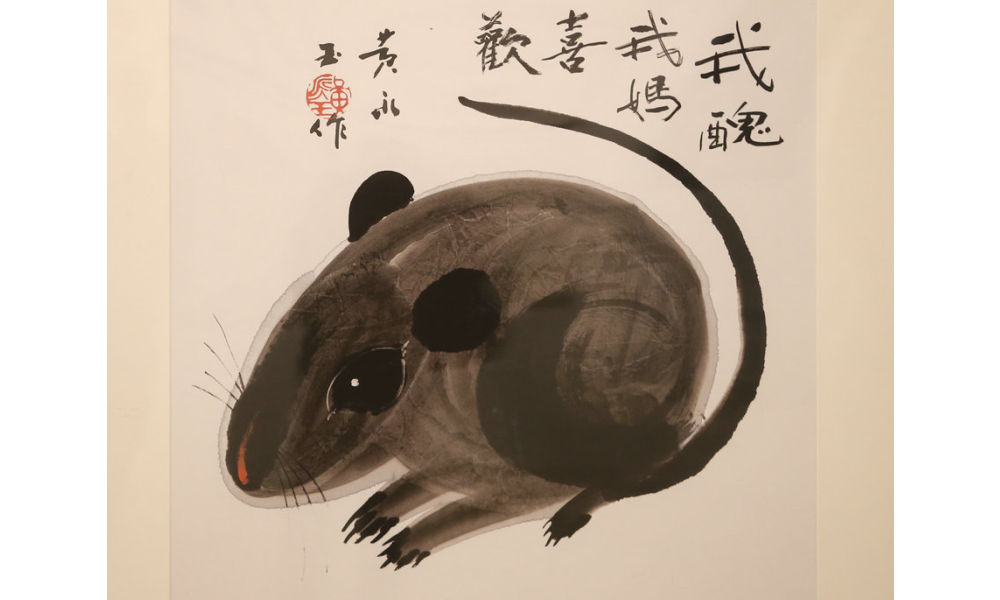
‘Ugly Mouse’ by Huang Yongyu [Image via China Daily].
Huang Yongyu was born on August 9, 1924, in Hunan’s Chengde as a native of the Tujia ethnic group.
He was born into an extraordinary family. His grandfather, Huang Jingming (黄镜铭), worked for Xiong Xiling (熊希齡), who would become the Premier of the Republic of China. His first cousin and lifelong friend was the famous Chinese novelist Shen Congwen (沈从文). Huang’s father studied music and art and was good at drawing and playing the accordion. His mother graduated from the Second Provincial Normal School and was the first woman in her county to cut her hair short and wear a short skirt (CCTV).
Born in times of unrest and poverty, Huang never went to college and was sent away to live with relatives at the age of 13. His father would die shortly after, depriving him of a final goodbye. Huang started working in various places and regions, from porcelain workshops in Dehua to artisans’ spaces in Quanzhou. At the age of 16, Huang was already earning a living as a painter and woodcutter, showcasing his talents and setting the foundation for his future artistic pursuits.
When he was 22, Huang married his first girlfriend Zhang Meixi (张梅溪), a general’s daughter, with whom he shared a love for animals. He confessed his love for her when they both found themselves in a bomb shelter after an air-raid alarm.
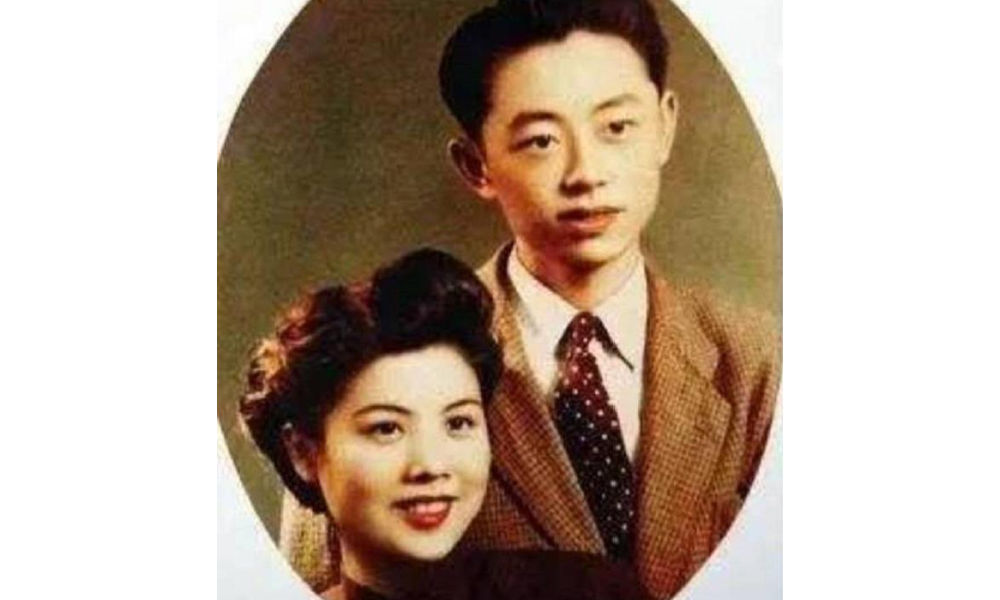
Huang and Zhang Meixi [163.com]
In his twenties, Huang Yongyu emerged as a sought-after artist in Hong Kong, where he had relocated in 1948 to evade persecution for his left-wing activities. Despite achieving success there, he heeded Shen Congwen’s advice in 1953 and moved to Beijing. Accompanied by his wife and their 7-month-old child, Huang took on a teaching position at the esteemed Central Academy of Fine Arts (中央美术学院).
The couple raised all kinds of animals at their Beijing home, from dogs and owls to turkeys and sika deers, and even monkeys and bears (Baike).
Throughout Huang’s career, animals played a significant role, not only reflecting his youthful spirit but also serving as vehicles for conveying satirical messages.
One recurring motif in his artwork was the incorporation of mice. In one of his famous works, a grey mouse is accompanied by the phrase ‘I’m ugly, but my mum likes me’ (‘我丑,但我妈喜欢’), reinforcing the notion that regardless of our outward appearance or circumstances, we remain beloved children in the eyes of our mothers.
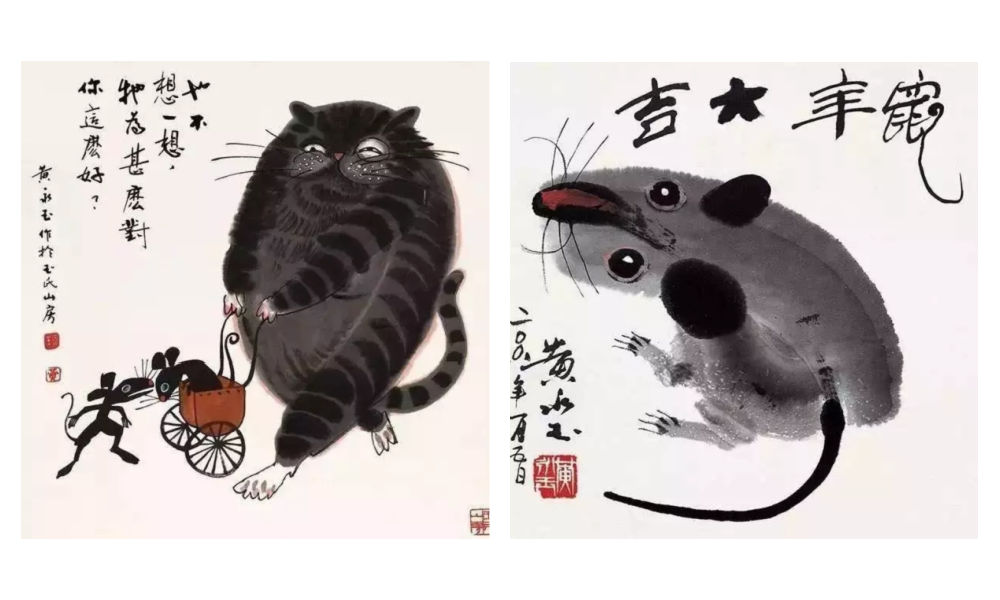
As a teacher, Huang liked to keep his lessons open-minded and he, who refused to join the Party himself, stressed the importance of art over politics. He would hold “no shirt parties” in which his all-male studio students would paint in an atmosphere of openness and camaraderie during hot summer nights (Andrews 1994, 221; Hawks 2017, 99).
By 1962, creativity in the classroom was limited and there were far more restrictions to what could and could not be created, said, and taught.
Bright Colors in Dark Times
“Strengthen my resolve and increase the fun of living”
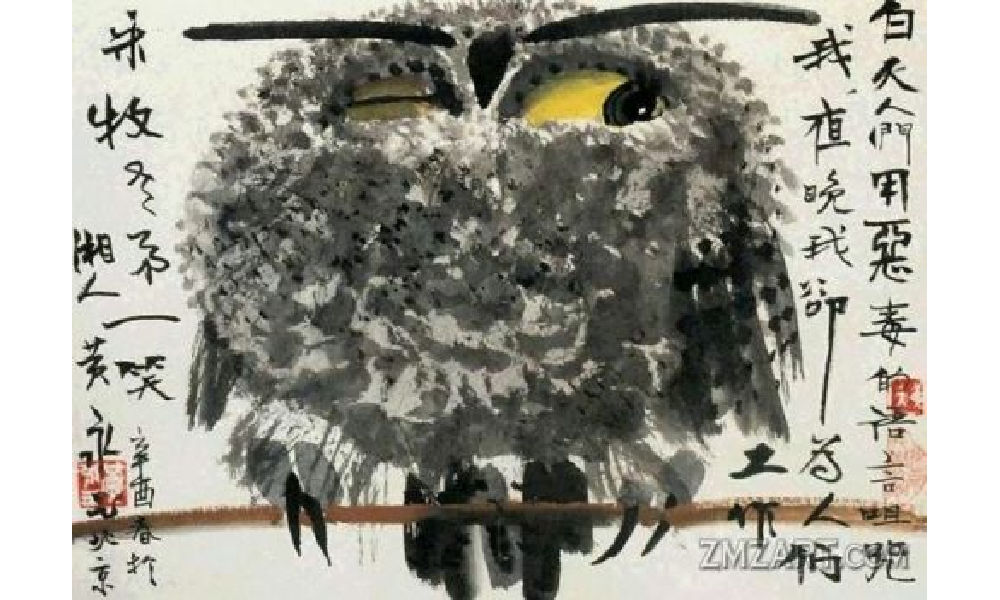
Huang Yongyu’s winking owl, 1973, via Wikiart.
In 1963, Huang was sent to the countryside as part of the “Four Cleanups” movement (四清运动, 1963-1966). Although Huang cooperated with the requirement to attend political meetings and do farm work, he distanced himself from attempts to reform his thinking. In his own time, and even during political meetings, he would continue to compose satirical and humorous pictures and captions centered around animals, which would later turn into his ‘A Can of Worms’ series (Hawks 2017, 99; see Morningsun.org).
Three years later, at the beginning of the Cultural Revolution, many Chinese major artists, including Huang, were detained in makeshift jails called ‘niupeng‘ (牛棚), cowsheds. Huang’s work was declared to be counter-revolutionary, and he was denounced and severely beaten. Despite the difficult circumstances, Huang’s humor and kindness would remind his fellow artist prisoners of the joy of daily living (2017, 95-96).
After his release, Huang and his family were relocated to a cramped room on the outskirts of Beijing. The authorities, thinking they could thwart his artistic pursuits, provided him with a shed that had only one window, which faced a neighbor’s wall. However, this limitation didn’t deter Huang. Instead, he ingeniously utilized vibrant pigments that shone brightly even in the dimly lit space.
During this time, he also decided to make himself an “extra window” by creating an oil painting titled “Eternal Window” (永远的窗户). Huang later explained that the flower blossoms in the paining were also intended to “strengthen my resolve and increase the fun of living” (Hawks 2017, 4; 100-101).
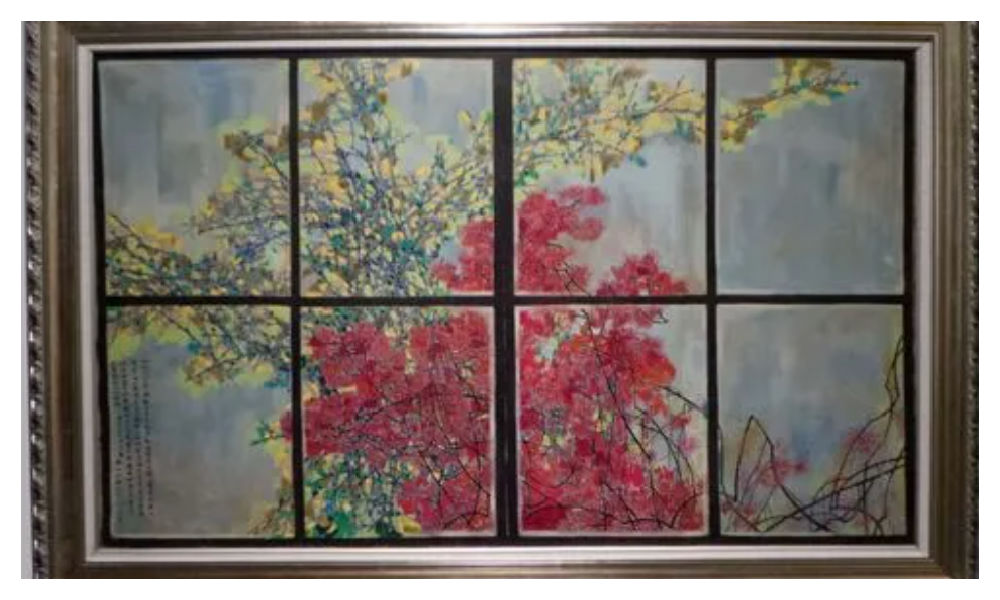
Huang Yongyu’s Eternal Window [Baidu].
In 1973, during the peak of the Cultural Revolution, Huang painted his famous winking owl. The calligraphy next to the owl reads: “During the day people curse me with vile words, but at night I work for them” (“白天人们用恶毒的语言诅咒我,夜晚我为他们工作”) (Matthysen 2021, 165).
The painting was seen as a display of animosity towards the regime, and Huang got in trouble for it. Later on in his career, however, Huang would continue to paint owls. In 1977, when the Cultural Revolution had ended, Huang Yongyu painted other owls to ridicules his former critics (2021, 174).
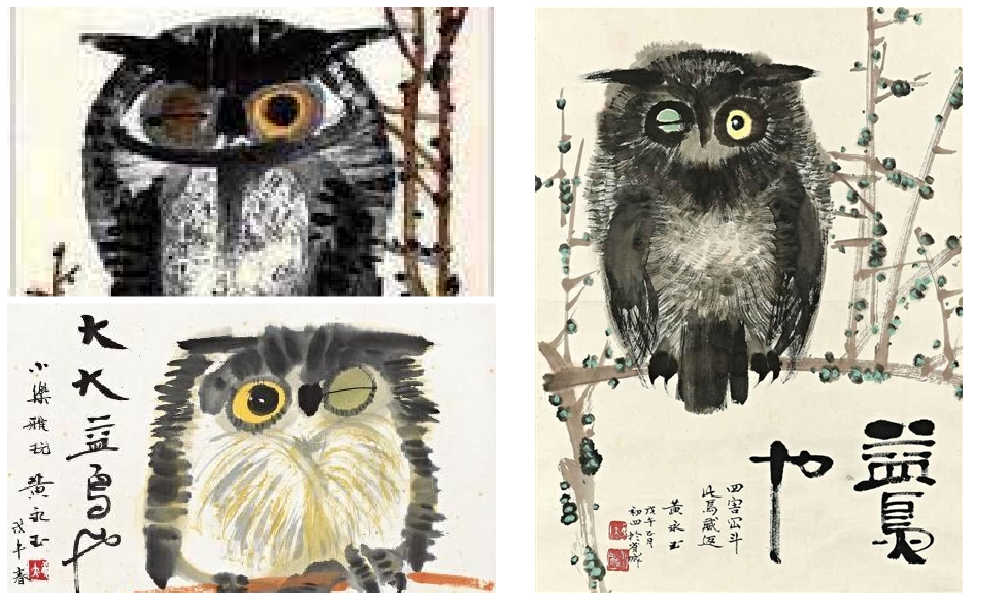
According to art scholar Shelly Drake Hawks, Huang Yongyu employed animals in his artwork to satirize the realities of life under socialism. This approach can be loosely compared to George Orwell’s famous novel Animal Farm.
However, Huang’s artistic style, vibrant personal life, and boundary-pushing work ethic also draw parallels to Picasso. Like Picasso, Huang embraced a colorful life, adopted an innovative approach to art, and challenged artistic norms.
An Optimist Despite All Hardships
“Quickly come praise me, while I’m still alive”

Huang Yongyu will be remembered in China with love and affection for numerous reasons. Whether it is his distinctive artwork, his mischievous smile and trademark pipe, his unwavering determination to follow his own path despite the authorities’ expectations, or his enduring love for his wife of over 75 years, there are countless aspects to appreciate and admire about Huang.
One things that is certainly admirable is how he was able to maintain a youthful and joyful attitude after suffering many hardships and losing so many friends.
“An intriguing soul. Too wonderful to describe,” one Weibo commenter wrote about Huang, sharing pictures of Huang Yongyu’s “Scenes of Pooping” (出恭图) work.
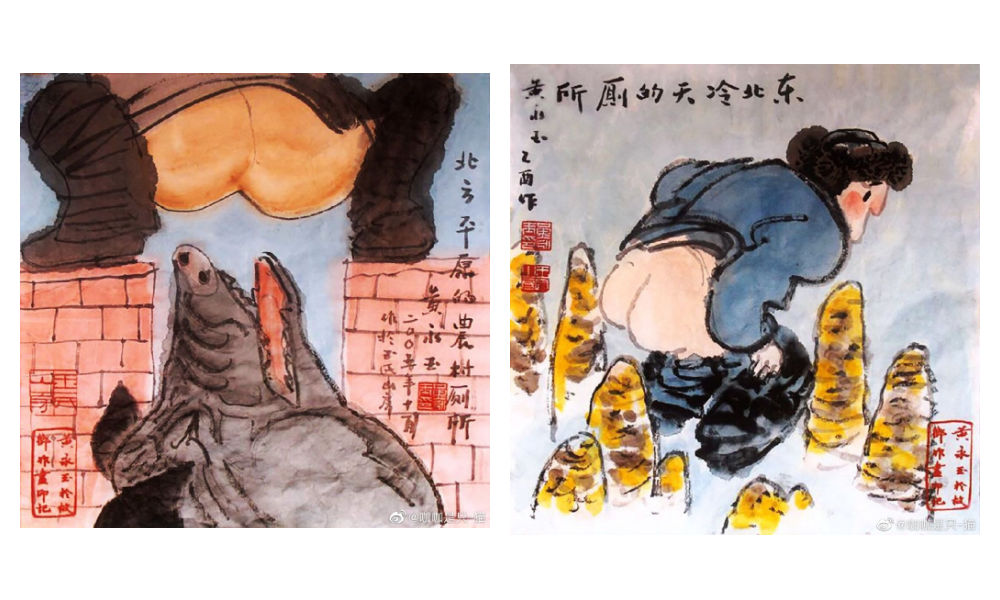
Old age did not hold him back. At the age of 70, his paintings sold for millions. When he was in his eighties, he was featured on the cover of Esquire (时尚先生) magazine.
At the age of 82, he stirred controversy in Hong Kong with his “Adam and Eve” sculpture featuring male and female genitalia, leading to complaints from some viewers. When confronted with the backlash, Huang answered, “I just wanted to have a taste of being sued, and see how the government would react” (Ora Ora).
I'm guessing the 98-year-old Huang loved the controversy. When confronted with backlash for his sculpture featuring male and female genitalia in 2007 Hong Kong, Huang answered, "I just wanted to have a taste of being sued, and see how the government would react." pic.twitter.com/kG0MVVM4SN
— Manya Koetse (@manyapan) June 15, 2023
In his nineties, he started driving a Ferrari. He owned mansions in his hometown in Hunan, in Beijing, in Hong Kong, and in Italy – all designed by himself (Chen 2019).
Huang kept working and creating until the end of his life. “It’s good to work diligently. Your work may be meaningful. Maybe it won’t be. Don’t insist on life being particularly meaningful. If it’s happy and interesting, then that’s great enough.”
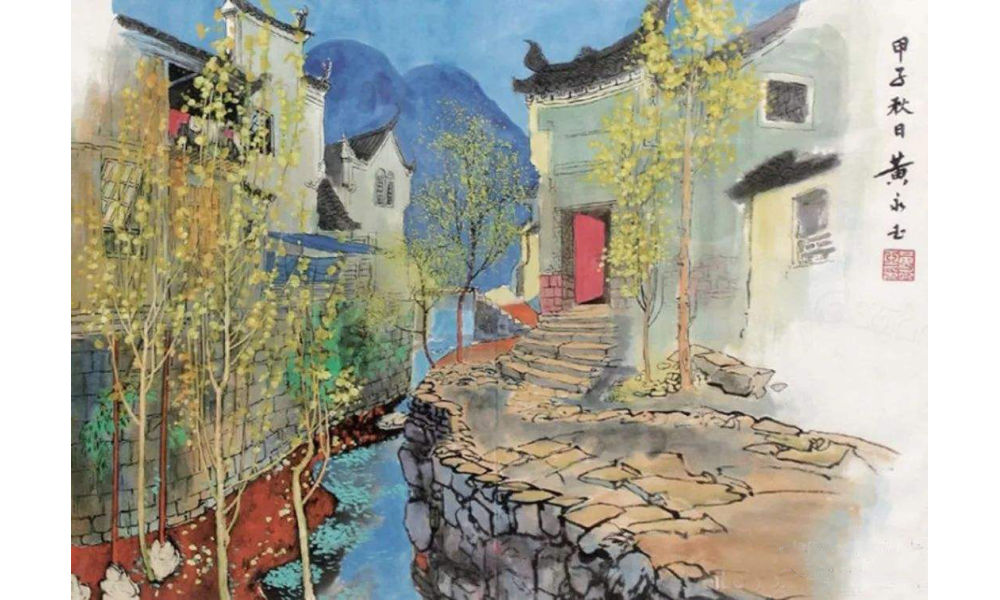
“Hometown Scenery” or rather “Hunan Scenery” (湘西风景) by Huang.
Huang did not dread the end of his life.
“My old friends have all died, I’m the only one left,” he said at the age of 95. He wrote his will early and decided he wanted a memorial service for himself before his final departure. “Quickly come praise me, while I’m still alive,” he said, envisioning himself reclining on a chair in the center of the room, “listening to how everyone applauds me” (CCTV, Sohu).
He stated: “I don’t fear death at all. I always joke that when I die, you should tickle me first and see if I’ll smile” (“对死我是一点也不畏惧,我开玩笑,我等死了之后先胳肢我一下,看我笑不笑”).

Huang with Yiwo (伊喔), the original model for the monkey stamp [Shanghai Observer].
Huang also was not sentimental about what should happen to his ashes. In a 2019 article in Guangming Daily, it was revealed that he suggested to his wife the idea of pouring his ashes into the toilet and flushing them away with the water.
However, his wife playfully retorted, saying, “No, that won’t do. Your life has been too challenging; you would clog the toilet.”
To this, Huang responded, “Then wrap my ashes into dumplings and let everyone [at the funeral] eat them, so you can tell them, ‘You’ve consumed Huang Yongyu’s ashes!'”
But she also opposed of that idea, saying that they would vomit and curse him forever.
Nevertheless, his wife expressed opposition to this idea, citing concerns that it would cause people to vomit and curse him indefinitely.
In response, Huang declared, “Then let’s forget about my ashes. If you miss me after I’m gone, just look up at the sky and the clouds.” Eventually, his wife would pass away before him, in 2020, at the age of 98, having spent 77 years together with Huang.
Huang will surely be missed. Not just by the loved ones he leaves behind, but also by millions of his fans and admirers in China and beyond.
“We will cherish your memory, Mr. Huang,” one Weibo blogger wrote. Others honor Huang by sharing some of his famous quotes, such as, “Sincerity is more important than skill, which is why birds will always sing better than humans” (“真挚比技巧重要,所以鸟总比人唱得好”).
Among thousands of other comments, another social media user bid farewell to Huang Yongyu: “Our fascinating Master has transcended. He is now a fascinating soul. We will fondly remember you.”
By Manya Koetse
Get the story behind the hashtag. Subscribe to What’s on Weibo here to receive our newsletter and get access to our latest articles:
References
Andrews, Julia Frances. 1994. Painters and Politics in the People’s Republic of China, 1949-1979. Berkley: University of California Press.
Baike. “Huang Yongyu 黄永玉.” Baidu Baike https://baike.baidu.com/item/%E9%BB%84%E6%B0%B8%E7%8E%89/1501951 [June 14, 2023].
CCTV. 2023. “Why Everyone Loves Huang Yongyu [为什么人人都爱黄永玉].” WeChat 央视网 June 14.
Chen Hongbiao 陈洪标. 2019. “Most Spicy Artist: Featured in a Magazine at 80, Flirting with Lin Qingxia at 91, Playing with Cars at 95, Wants Memorial Service While Still Alive [最骚画家:80岁上杂志,91岁撩林青霞,95岁玩车,活着想开追悼会].” Sohu/Guangming Daily March 16: https://www.sohu.com/a/301686701_819105 [June 15, 2023].
Hawks, Shelley Drake. 2017. The Art of Resistance Painting by Candlelight in Mao’s China. Seattle: University of Washington Press.
Matthysen, Mieke. 2021. Ignorance is Bliss: The Chinese Art of Not Knowing. Palgrave Macmillan.
Ora Ora. “HUANG YONGYU 黃永玉.” Ora Ora https://www.ora-ora.com/artists/103-huang-yongyu/ [June 15, 2023].
Spotted a mistake or want to add something? Please let us know in comments below or email us. First-time commenters, please be patient – we will have to manually approve your comment before it appears.
©2023 Whatsonweibo. All rights reserved. Do not reproduce our content without permission – you can contact us at info@whatsonweibo.com.
Subscribe

Weibo Watch: The Future is Here

“Bye Bye Biden”: Biden’s Many Nicknames in Chinese

Enjoying the ‘Sea’ in Beijing’s Ditan Park

A Triumph for “Comrade Trump”: Chinese Social Media Reactions to Trump Rally Shooting

Weibo Watch: Get Up, Stand Up

The Tragic Story of “Fat Cat”: How a Chinese Gamer’s Suicide Went Viral

“Old Bull Eating Young Grass”: 86-Year-Old Chinese Painter Fan Zeng Marries 36-Year-Old Xu Meng

A Brew of Controversy: Lu Xun and LELECHA’s ‘Smoky’ Oolong Tea

Singing Competition or Patriotic Fight? Hunan TV’s ‘Singer 2024’ Stirs Nationalistic Sentiments

Zara Dress Goes Viral in China for Resemblance to Haidilao Apron

Weibo Watch: The Battle for the Bottom Bed

About the “AI Chatbot Based on Xi Jinping” Story

China’s Intensified Social Media Propaganda: “Taiwan Must Return to Motherland”

Weibo Watch: Telling China’s Stories Wrong

Saying Goodbye to “Uncle Wang”: Wang Wenbin Becomes Chinese Ambassador to Cambodia
Get in touch
Would you like to become a contributor, or do you have any tips or suggestions? Get in touch here!
Popular Reads
-

 China Insight3 months ago
China Insight3 months agoThe Tragic Story of “Fat Cat”: How a Chinese Gamer’s Suicide Went Viral
-

 China Music4 months ago
China Music4 months agoThe Chinese Viral TikTok Song Explained (No, It’s Not About Samsung)
-

 China Digital10 months ago
China Digital10 months agoToo Sexy for Weibo? Online Discussions on the Concept of ‘Cābiān’
-

 China Arts & Entertainment12 months ago
China Arts & Entertainment12 months agoBehind 8 Billion Streams: Who is Dao Lang Cursing in the Chinese Hit Song ‘Luocha Kingdom’?





Unbiased Doll
September 30, 2020 at 2:37 am
Unfortunately racism is prevalent in China and Asian societies. Even the Asian international students who come to the west e.g. US tend to be very racist towards people of color. This is not just limited to Blacks but to South Asians, Latinos or others. They are simply rude and disrespectful willing to ignore the laws and regulations of the country (e.g. pedestrian laws when driving). Initially I thought they were just not used to customs and etiquettes but then the same people showed a well mannered attitude towards white people. So I definitely can vouch the racism is ingrained in Chinese and Asian culture (mostly hung out with Chinese but I also observed this in Korean, Indonesian and Vietnamese).
Charles Kaltwasser
July 10, 2021 at 3:59 pm
an american anti racist tried to kill me today because he curiously deems me to be “racist.”
What puzzles me is that the mafiaesque black lives matter group in USA says nothing about the thousands of black lives lost at sea
trying to escape Libya after Obama and the French President now in jail sponsored the destruction of Gaddafy
Libya
I am trying to be nonfiction here
Charles Kaltwasser
July 10, 2021 at 4:04 pm
hello
你好吗